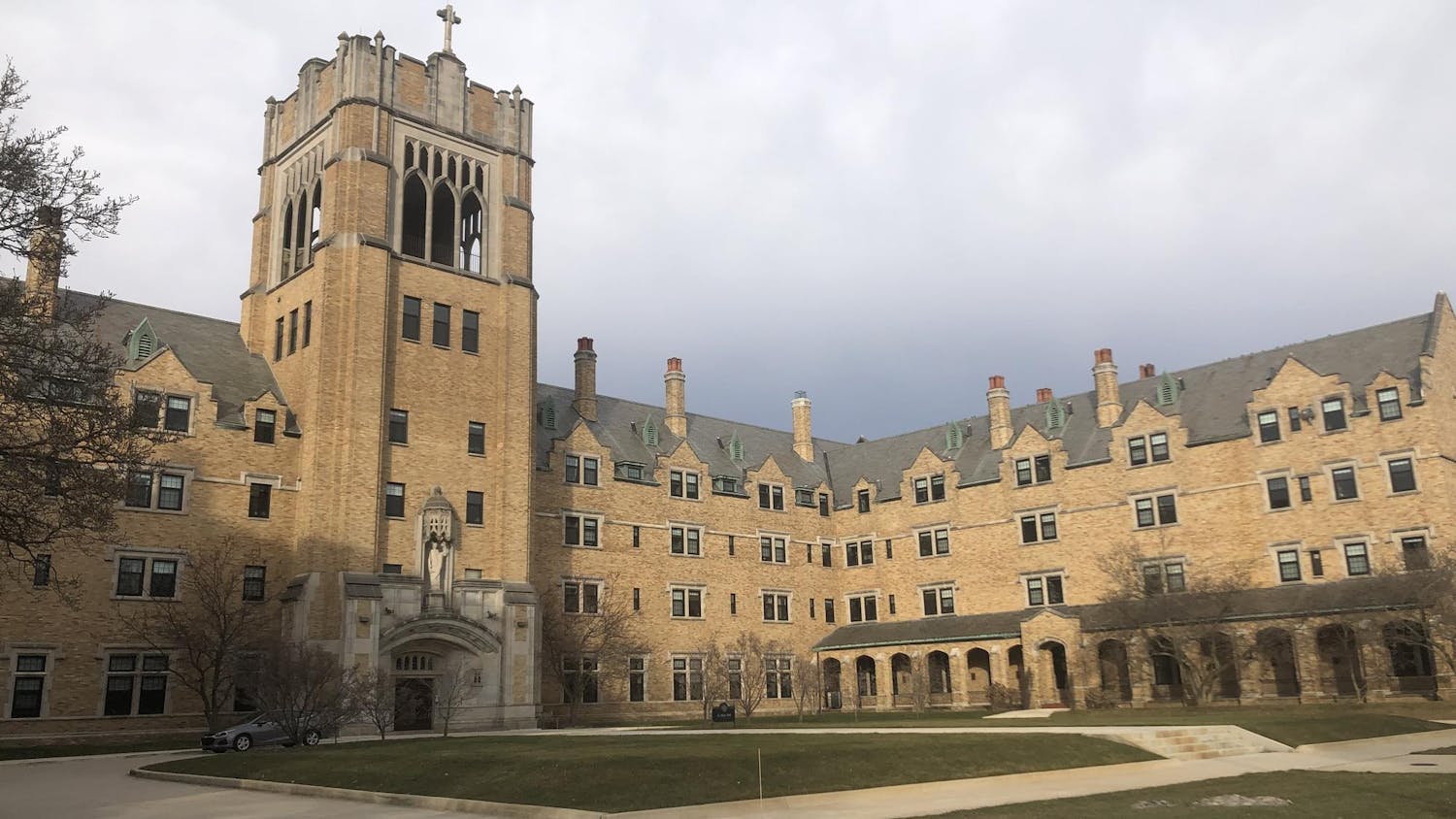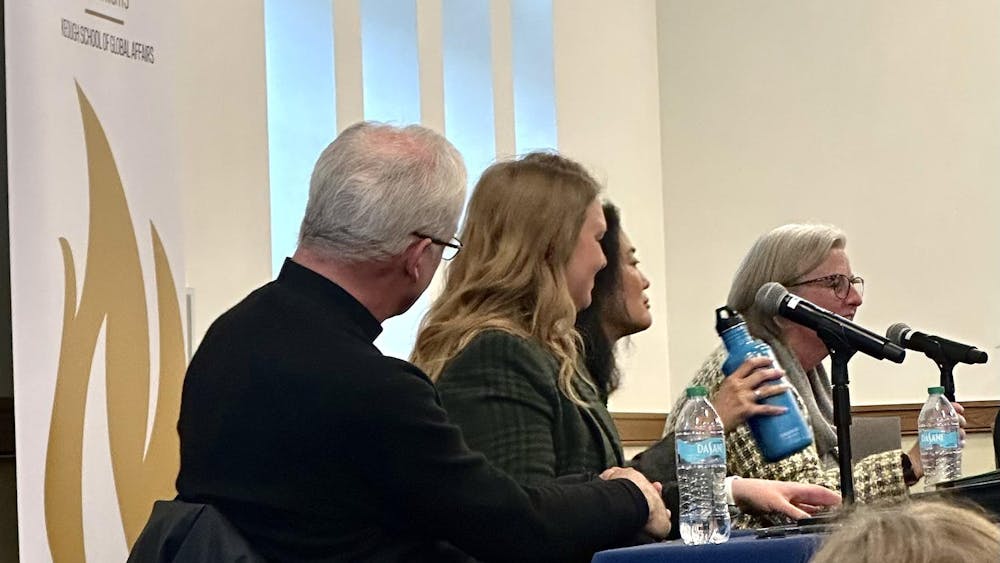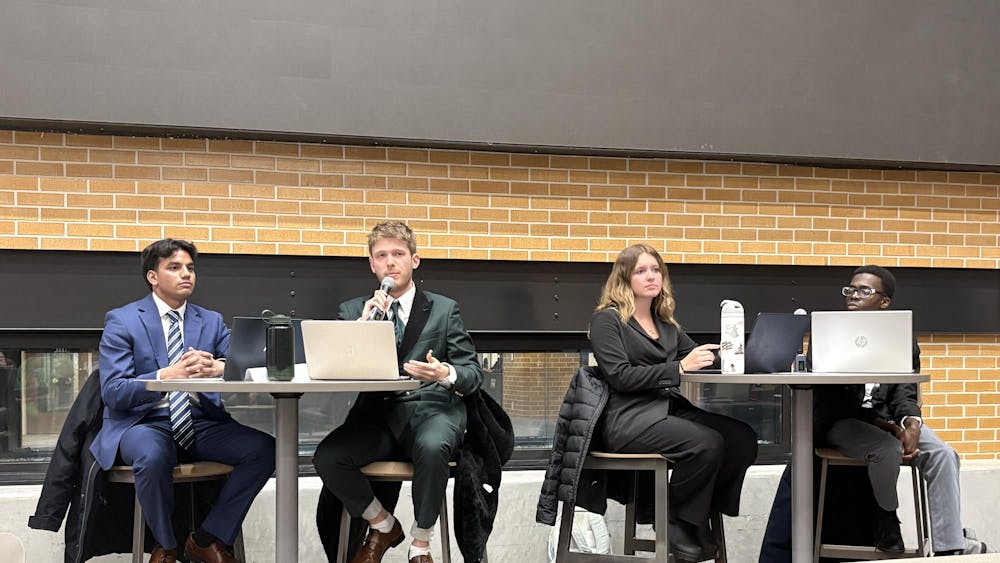Juniors Allan Njomo and Matthew Bisner are committed to bold ideas.
With an 11-page platform, Njomo and Bisner are one pair of three tickets vying for student body president and vice president respectively this election cycle.
Njomo is a business analytics and political science major originally from Arlington, Texas. On campus, Njomo lives in Stanford Hall and serves currently as its hall president. He previously served as Stanford’s hall senator, and he’s a member of Fighting Irish Scholars, Young Life Michiana Team and Wabruda.
Bisner is a political science, peace studies and gender studies major who hails from Ocean Springs, Mississippi. Bisner currently lives in Baumer Hall and is co-vice president of PrismND. Bisner was also Judicial Council President before he stepped down from the position to run for student body vice president.
Bisner said their first priority if elected would be to expand sexual education materials on campus and increase student awareness to University Health Services’ STI testing, sexual health screenings and HPV vaccination services.
“No one’s been talking about sexual education, or the sexual health of this campus,” Bisner said, noting that Notre Dame draws from a “largely abstinence-only high school population.”
As first-generation, low-income students themselves, Njomo and Bisner look to prioritize financial inclusion by fighting to make Notre Dame affordable for students. Specifically, the team hopes to work with the Office of Student Enrichment to subsidize summer classes for first-generation, low-income students and to generate pride among these students with a Scholars’ Lounge and graduation tassels.
“I am a QuestBridge student, but I did not receive a full scholarship,” Njomo said. “And whenever that textbook list comes, and I see how much I have to pay for textbooks, my heart always sank. And I wasn’t always able to put money together, and I had to reach out to sources and see if they could help me.”
Another critical element of the Njomo-Bisner platform is improving community through more open communication on campus. Their team plans to implement student voice summits to give students a voice in campus policy and programs and send out a biweekly newsletter to update students. Njomo and Bisner would hold virtual and in-person office hours while emphasizing an open-door policy in the student government office.
Njomo said their team also wants to work on transparency between the administration and student government and hold University leadership accountable.
“We’ve been in several meetings, Matty and I, where as students we speak about issues that we are passionate about and no action is taken,” Njomo said.
In addition to working with the administration, Njomo said one of the key challenges facing students is maintaining sustainable practices while adhering to COVID-19 protocols. The ticket plans on working with the Office of Sustainability and encouraging the University to halt investments in the fossil fuel industry and transitioning University computers to use Ecosia.
“Divestment from fossil fuel industry has been a demand since the early 2010s, and it’s part of our platform to research investments to give to students, and hopefully build up a strong campus climate that can respond and mobilize around those issues,” Bisner said.
Like many of the past student government administrations, the Njomo-Bisner ticket will continue to pressure the University to alter the non-discrimination clause to include sexual orientation and gender identity. Bisner admitted changing the policy will be a challenge, and students will likely continue to fight for this revision in years to come.
Among a number of other reforms, Njomo and Bisner hope to increase accessibility on campus, re-establish the annual powwow with Native American Student Association of Notre Dame and Multicultural Student Programs and Services and encourage more students to participate in GreeNDot.
Njomo said he’s motivated to run for student body president partly because he hasn’t always felt he was a part of the community.
“There’s so many students are Notre Dame that haven’t felt like they belong, and the numbers for the Campus Climate survey are very indicative of that,” Njomo. “As a Black student here at Notre Dame, I remember stepping on campus and not seeing a lot of people that look like me. And for the longest time that made me feel like an outsider.”
Even with such a long platform, Njomo and Bisner said they believe their ideas are feasible, though they are bold.
“We just have to be creative in how we approach issues,” Njomo said.
Student body presidential candidates: Allan Njomo and Matthew Bisner
Courtesy of Matthew Bisner
Juniors Allan Njomo (right) and Matthew Bisner (left) are running for Notre Dame student government president and vice president.









